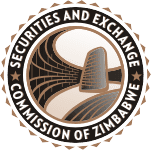Anti-Money Laundering (AML)/ Countering Terrorist Financing (CFT) and Proliferation of Weapons of Mass Destruction (CPF)
What are AML/ CFT and CPF?
AML/CFT and CPF are the measures put in place to combat money laundering, terrorist financing and proliferation of weapons of mass destruction.
SECZ’s role in AML/CFT and CPF
In terms of Part ll (18), First Schedule of the Money Laundering and Proceeds of Crime Act [9:24], SECZ is designated as a Competent Supervisory Authority, responsible for overall supervision of the securities industry.
The Securities and Exchange Commission (SECZ) is empowered by the Money Laundering and Proceeds of Crime Act [9:24], as Supervisory Body to assist and enforce Securities Market Intermediaries (SMIs) to comply with all the AML/CFT/PF legislations. The Commission’s commitment to combating Money Laundering, Financing of Terrorism and Proliferation Financing is fully aligned with its mandate – “To be a world-class regulator of diverse, efficient, lucrative and secure capital markets underpinned by strong institutions”.
SECZ adheres to international best practices to combat Money Laundering and Financing of Terrorism and uses the following legislations in fulfilling its mandate:
- Securities and Exchange Act [Chapter 24:25]
- Money Laundering and Proceeds of Crime Act [Chapter 9:24],
- Bank Use Promotion Act [Chapter 24:24],
- Suppression of Foreign and International Terrorism Act [Chapter 11:21],
- Statutory Instrument 76 of 2014: Suppression of Foreign and International Terrorism (Application of UNSCR 1267 of 1999 and UNSCR 1373 of 2001) Regulations, 2014, and
- Statutory Instrument 56 of 2019: Suppression of Foreign and International Terrorism (Application of UNSCR 1540 (2004)1673, 1810, 1887, 1977 (On Non-State Actor Proliferation), 1695,1718, 1874 on Democratic People’s Republic of Korea and 1696,1737, 1747, 1803 and 1929, UNSCR 2094 (2013), 2231 (2015) UNSCR 2270 (2016), UNSCR 2321 (2016), UNSCR 2371 (2017), of UNSCR 2375 (2017) UNSCR 2397 (2017) and Successor UNSCRs) Regulations, 2019.
- Statutory Instrument 100 of 2010: Securities (Registration, Licensing and Corporate Governance) Rules a
- Statutory Instrument 63 of 2013, Securities (Central Securities Depository) Rules, 2013.
- Statutory Instrument 100 of 2016, Securities (Alternative Trading Platform) Rules
SECZ’s mandate is to make sure all SMIs are complying with AML/CFT /CPF legislations and SECZ set Guidelines. To ensure this, SMIs must possess Customer Acceptancy Policies, Customer Identification Programmes, documented red flags of money laundering, terrorist financing, detection and prevention of money laundering, records of currency transaction reports, and suspicious transaction reports, among others. SMIs should appoint an officer supposedly at Senior Management position to oversee day to day activities of AML/CFT / CPF compliance.
Supervision Effectiveness
In order to strengthen the securities sector, and reduce vulnerability to money laundering, terrorist financing and proliferation financing, the Commission launched “AML/CFT Risk Based Supervision” in December 2015 after publication of the Zimbabwe 1st National Risk Assessment Report in June 2015. Further the Commission Issued:
- AML/CFT/CPF Risk Based Supervision Framework and manual.
- AML/CFT/CPF Compliance Inspection Manual for Securities Market Intermediaries
- Comprehensive Licensing Manual for Securities Market Intermediaries
AML/CFT/CPF Securities Market Booklet
Sub-headings:
- Manuals
- Guidance Notes
- Directives
- Sectoral Risk Assessment
- UNSC Updates
- Administrative Sanctions
- Zimbabwe’s AML/CFT/PF Legal Framework

